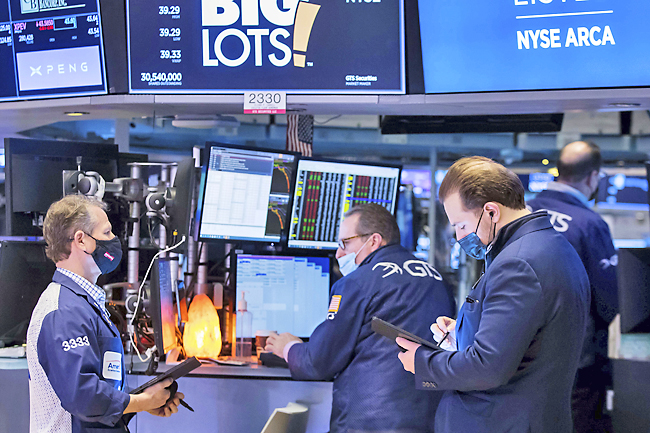AP – Stocks fell again on Wall Street, capping off the worst weekly drop for the S&P 500 since the start of the pandemic.
Investors have grown increasingly worried about rising inflation and how aggressive the Federal Reserve might be in raising interest rates to tamp it down. Historically low rates helped support the broader market as the economy absorbed a sharp hit from the pandemic in 2020 and then recovered over the last two years.
The S&P 500 fell 84.79 points, or 1.9 per cent, to 4,397.94. The benchmark index has now slipped three straight weeks to start the year. It fell 5.7 per cent this week, its worst weekly decline since March of 2020 when the pandemic sent stocks into a bear market. The Dow Jones Industrial Average fell 450.02 points, or 1.3 per cent, to 34,265.37 and also fell for its third straight week.
The tech-heavy Nasdaq fell 385.10, or 2.7 per cent, to 13,768.92. With investors expecting the Fed to begin raising rates as soon as its March policy meeting, shares in pricey tech companies and other expensive growth stocks have looked relatively less attractive. The index has fallen for four straight weeks and is now more than 10 per cent below its most recent high, putting it in what Wall Street considers a market correction. The Nasdaq is down 14.3 per cent from the record high set on November 19.
“As always, once the volatility starts, investors pile on exacerbating the downward volatility,” said CEO of Laffer Tengler Investments Nancy Tengler.
Technology and communications stocks were among the biggest drags on the market on Friday.
Streaming video service Netflix plunged 21.8 per cent after it delivered another quarter of disappointing subscriber growth. Disney, which has also been trying to grow its subscriber base for its streaming service, fell 6.9 per cent.
Treasury yields fell sharply as investors turned toward safer investments. The yield on the 10-year Treasury fell to 1.76 per cent from 1.83 per cent late Thursday. The drop weighed on bank stocks, which rely on higher yields to charge more lucrative interest on loans.










